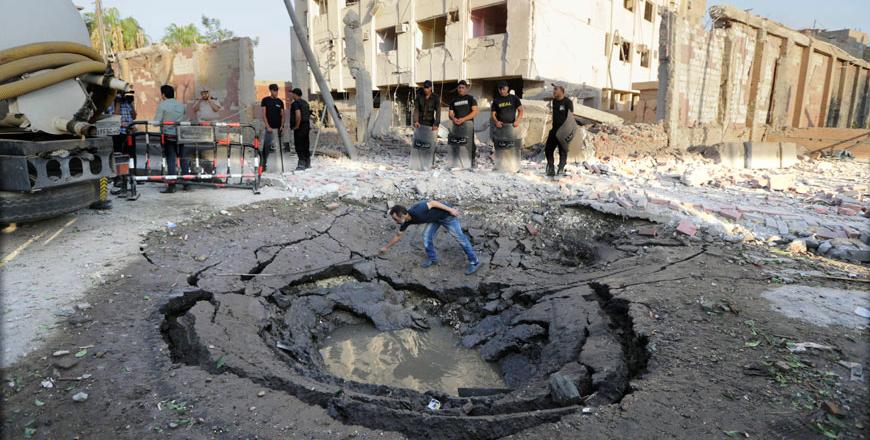You are here
Sisi approves anti-terrorism law creating special courts
By Reuters - Aug 18,2015 - Last updated at Aug 18,2015
CAIRO — Egyptian President Abdel Fattah Al Sisi approved an anti-terrorism law that sets up special courts and protects its enforcers in the face of a two-year-old Islamist insurgency that aims to topple his government.
The law has come under fire from human rights groups who accuse Sisi, who as military chief deposed a freely elected Islamist president in 2013, of exploiting security threats to roll back political freedoms won in the 2011 uprising that toppled veteran autocrat Hosni Mubarak.
Cleared on Sunday, the law details sentences for various terrorism crimes ranging from five years to the death penalty. It also shields those applying it, such as the military and police, from legal ramifications for what it calls the proportionate use of force "in performing their duties".
Sisi had promised a tougher legal system in July after a car bomb attack in Cairo that killed the chief public prosecutor, the highest ranking state official to be killed in years.
The law allows for the establishment of special courts that the government says will process terrorism cases faster because they won't be bogged down with other criminal cases. It was not known whether trials would be open or closed to the public.
Forming or leading a group deemed a “terrorist entity” by the government will be punishable by death or life in prison under the new law, and membership in such a group will carry up to 10 years in jail.
Financing “terrorist groups” will bring a penalty of life in prison, which in Egypt is 25 years. Inciting violence, which includes “promoting ideas that call for violence”, will lead to 5-7 years in jail, as would creating or using websites that spread such ideas.
Journalists will be fined for contradicting the authorities’ version of any militant attack. The original draft of the law was amended following a domestic and international outcry after it initially stipulated imprisonment for such an offence.
“This is taking us back to the Mubarak era and the 30-year state of emergency that helped push Egyptians to the streets in 2011,” Mohamed Elmessiry, Egypt researcher at Amnesty International, said.
“Despite security forces having a record of excessive use of force, this law... paves the way for impunity.”
Sisi essentially rules by decree as Egypt’s parliament has been suspended since 2012 when a court dissolved the democratically elected main chamber, undoing a major accomplishment of the 2011 revolt.
Elmessiry also said the law would in effect remove the current two-year limit on pre-trial detention by allowing prosecutors to seek to renew suspects’ detention indefinitely.
“The law contravenes the Egyptian constitution and national laws, let alone international law,” he said.
Egypt, the Arab world’s biggest nation, is confronted by an increasingly violent insurgency in North Sinai, where the most active militant group has pledged allegiance to the Daesh terror group. Cairo and other cities have also witnessed Islamist bloodshed.
The insurgency, which has killed hundreds of soldiers and police, has intensified since mid-2013 when then-army chief Sisi overthrew president Mohamed Morsi, a top figure in the Muslim Brotherhood, after mass unrest against his rule.
Sisi has since presided over a no-holds-barred security crackdown on Islamists. Thousands of alleged Islamist supporters have been jailed and scores have been sentenced to death, including Morsi and other senior Brotherhood figures.
Sisi’s government deems the Brotherhood a terrorist group and does not distinguish between it and violent militants. The Brotherhood, Egypt’s oldest opposition movement dating back decades, says it remains committed to peaceful activism.
“The terrorism problem is not a problem of a lack of legal provisions, but of strategic vision,” said Mohamed Zaree at the Cairo Institute for Human Rights Studies.
“The government strategy is to crush freedoms while it has shown no success in combating terror,” he said, pointing to a spate of recent high-profile attacks occurring even as the powers of security services have been expanded.
Related Articles
Egyptian President Abdel Fattah Al Sisi has signed off an anti-terrorism law that gives authorities more sweeping powers to ban groups on charges ranging from harming national unity to disrupting public order.
Egypt’s Cabinet approved on Wednesday a draft anti-terrorism law that would give the government blanket power to ban groups on charges ranging from harming national unity to disrupting public order.
CAIRO — The Daesh terror group’s Egypt affiliate said it was behind a car bombing that wounded 30 people, including 8 policemen, near a stat

















